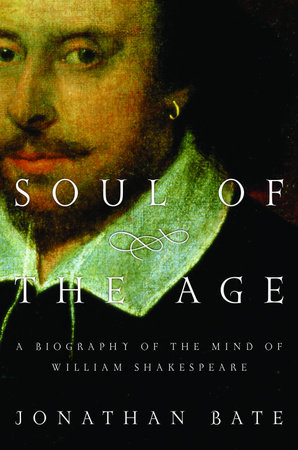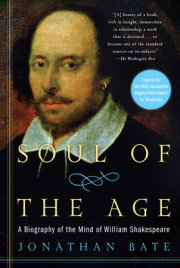Chapter One
STRATFORD 1564
Here begins the plague
...
Exit pursued by a bear: antigonus is torn to pieces. a clownish young shepherd witnesses his death on land and many more losses on the sea as a tempest-tossed ship is swallowed by the waves. “A sad tale’s best for winter,” little Prince Mamillius has said, before being struck by death himself. But Shakespeare’s Winter’s Tale veers from tragedy to comedy. Young Shepherd’s breathless description of heavy matters is counterpointed against Old Shepherd’s amazed discovery of new life in the form of the abandoned baby Perdita. “Thou met’st with things dying,” he serenely remarks to his son, “I with things new born.”
In Shakespeare’s England, birth and death went cheek by jowl. Each entry in the parish register of Holy Trinity Church, Stratford-upon- Avon, is encoded with a single letter: C for christened, M for married, and B for buried. A ceaseless procession of birth, copulation, and death: human life stripped to its essentials. Shortly after the entry that reads “1564, Apr. 26. C. Gulielmus filius Johannes Shakspere”—April 26, 1564, christened, William, son of John Shakespeare—the entries marked B begin to thicken on the page. There were no more than twenty deaths in the first half of 1564, well over two hundred in the second. The population of this small but prosperous market town in the English Midland county of Warwickshire was about fifteen hundred, so more than one in seven were taken in those few months of devastation. The cause is duly noted in a marginal annotation opposite the burial entry for Oliver Gunne, apprentice: hic incepit pestis. Here begins the plague.
In August, the town council met in emergency session in the garden of the Gild Chapel, hoping that the outdoor air would be less contagious than that of the Gild Hall. They discussed relief for the plague victims. “Burgess” (councillor) John Shakespeare gave a generous sum of money. The horror faced by the townspeople may be glimpsed from a contemporary account of a plague outbreak in London. If just one member of a family was struck down, the rest would have been closed up in the house to prevent the spread of infection:
What an unmatchable torment were it for a man to be barred up every night in a vast silent charnel-house? Hung (to make it more hideous) with lamps dimly and slowly burning, in hollow and glimmering corners: where all the pavement should, instead of green rushes, be strewed with blasted rosemary, withered hyacinths, fatal cypress and yew, thickly mingled with heaps of dead men’s bones: the bare ribs of a father that begat him, lying there: here the chapless hollow skull of a mother that bore him.
The previous year, John and Mary Shakespeare had lost their infant Margaret at four months, and sometime before that, another girl, Joan. Cause of deaths unknown. But the loss not uncommon—everyone knew infant mortality.
They were doubly lucky this time. William was what every respectable couple wanted: a son to maintain the family name and estate. His sex was their first stroke of good fortune. Second was his survival of the plague. What John and Mary could never know was that he would not merely survive, but make the Shakespeare name live as long as humankind has books and stories.
Plague was the single most powerful force shaping his life and those of his contemporaries. John Stow’s annals of English history summarized the key events of the year of Shakespeare’s birth. The previous autumn, Londoners had suffered terribly: “Forsomuch as the plague of pestilence was so hot in the city of London, there was no term kept at Michaelmas: to be short, the poor citizens of London were this year plagued with a threefold plague, pestilence, scarcity of money, and dearth of victuals: the misery whereof, were too long here to write, no doubt the poor remember it, the rich by flight into the countries made shift for themselves.”
John Stow, denominated “Citizen of London” on his title page, would not have bothered to record an outbreak of plague in a small town in the Midlands. There is London and there is the rest of England. London is far bigger than every other conurbation. It is more densely populated, so the spread of plague is more rapid. And it is the location of the institutions that govern the nation: the royal court, the houses of Parliament and the law courts, Lambeth Palace (London residence of the archbishop of Canterbury and administrative headquarters of the Church of England). In bad times, the rich and their institutions could take flight to the country, leaving the London poor to shift for themselves. The royal court was supremely mobile, with the queen moving on a whim or a plague warning from Whitehall in central London to one of her other palaces—Greenwich downstream, Hampton Court upstream, Richmond or Windsor secluded in their deer parks, or Nonsuch deep in rural Surrey.
It was a litigious age. Stow measures the seasons by the four terms of the legal year, when the courts were in session. During times of plague, as in Michaelmas term (October to December) 1563 and Hilary term (January to March) 1564, the judges and lawyers met out of town. Throughout Shakespeare’s professional career, there were close links between the worlds of law and theater. Many of his fellow dramatists trained at the Inns of Court. Law students were a key element of the theater audience. Hack writer Tom Nashe railed against the “tedious dead vacation” when there were no lawyers to see his plays or buy his pamphlets. And, like the law courts, the acting companies traveled out of town when plague was severe.
So it was that plague determined several turning points in Shakespeare’s career. In January 1593, just as he was making his name as an actor turned playwright, an order went out from the Privy Council: “Forasmuch as by the certificate of the last week it appeareth the infection doth increase . . . we think it fit that all manner of concourse and public meetings of the people at plays, bear- baitings, bowlings and other like assemblies for sports be forbidden.” Save for a few weeks’ remission the following winter, the theaters remained closed for a year and a half. The actors toured, while a different Shakespeare emerged. The rewrite man, the patcher of old plays from the existing repertoire, turned himself into an original poet. In April 1593, he published “the first heir” of his “invention,” Venus and Adonis. Its stylistic brilliance and risqué content made his name among the smart set. It became the bestselling long poem of the age, the favored reading of undergraduates and Inns of Court men. Dedicated to Henry Wriothesley, the third earl of Southampton, it was also a bid for patronage.
The dedicatory epistle that begins the more serious and rhetorically elaborate follow-up poem, The Rape of Lucrece, published the next year, suggests that the bid was successful. Where Shakespeare’s letter prefacing Venus and Adonis dwells on his “hopeful expectation,” the one attached to Lucrece speaks repeatedly of “duty” and devoted service: “What I have done is yours, what I have to do is yours, being part in all I have, devoted yours.” There is a strong possibility that Shakespeare spent part of the plague year in some form of service in Southampton’s household at Titchfield in Hampshire.
The association with Southampton had three key consequences. It transformed Shakespeare from jobbing playwright to courtly poet, marked him out as the crossover man who could appeal equally to penny- paying groundlings and powerful courtiers or even the queen herself. Politically, it brought him into the orbit of the earl of Essex, to whom young Southampton was devoted. This would have potentially dangerous consequences a few years later. And intellectually, it introduced him to the work of the Anglo-Italian man of letters John Florio, Southampton’s tutor, through whom he was exposed to Italian culture and, later, the essays of Michel de Montaigne, whose subtle, sympathetic mind was perfectly attuned to his own.
The plague of 1593– 94 provided an enforced sabbatical after which Shakespeare returned to the theater with a new-minted verbal art. In the next couple of years, he wrote the plays in which his literary style truly matures: the dazzlingly intellectual (Florioesque) Love’s Labour’s Lost, the miraculously imaginative Midsummer Night’s Dream, and the quicksilver Romeo and Juliet, with its growth from love’s artifice to the heart’s authenticity. When Mercutio dies with the words “A plague o’ both your houses,” it is no idle oath: the play was written in the aftermath of a period when the households of many members of Shakespeare’s London audience would have been struck by plague. And plague is indeed subtly woven into the plot: the reason Romeo does not get Friar Laurence’s crucial letter is that Friar John is detained for fear that he might have been infected. Parents are supposed to die before their children, the old before the young. With plague, it is not always like that. The tragic irony of Romeo and Juliet is that the houses of both Capulet and Montague escape the plague, yet still the children die first. The final scene takes place in an ancestral tomb, but those who lie dead are the flower of a city’s youth—Mercutio, Tybalt, Paris, Juliet, and her Romeo.
Copyright © 2009 by Jonathan Bate. All rights reserved. No part of this excerpt may be reproduced or reprinted without permission in writing from the publisher.




